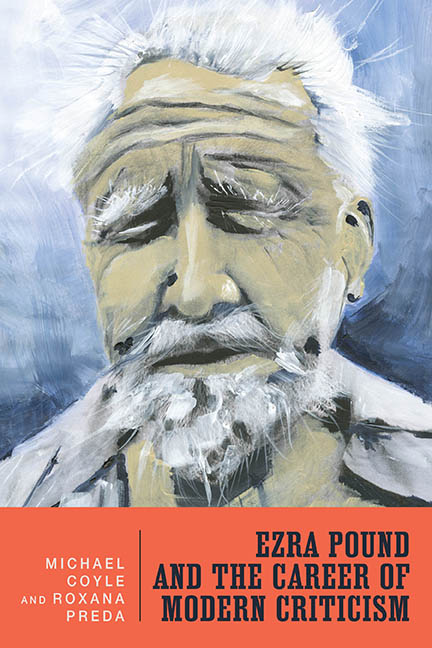Book contents
- Frontmatter
- Dedication
- Contents
- Preface
- Acknowledgments
- 1 From Wabash to Washington, 1907–1947
- 2 A Prize Fight and Institutionalization, 1948–1951
- 3 Kenner, Watts, and Professional Attention, 1951–1961
- 4 Sailing after Knowledge, 1962–1971
- 5 The Pound Era and Its Monumental Companion, 1971–1985
- 6 Pound Studies and the Postmodern Turn, 1980–1990
- 7 Reading Pound in the New Millennium, 1990–2016
- 8 The Many Lives of Ezra Pound: Biographies and Memoirs, 1960–2015
- 9 Educating the World: Periodicals on Ezra Pound, 1954–2017
- Conclusion
- Chronology of the Bollingen Controversy
- Works Cited
- Index
1 - From Wabash to Washington, 1907–1947
Published online by Cambridge University Press: 17 July 2019
- Frontmatter
- Dedication
- Contents
- Preface
- Acknowledgments
- 1 From Wabash to Washington, 1907–1947
- 2 A Prize Fight and Institutionalization, 1948–1951
- 3 Kenner, Watts, and Professional Attention, 1951–1961
- 4 Sailing after Knowledge, 1962–1971
- 5 The Pound Era and Its Monumental Companion, 1971–1985
- 6 Pound Studies and the Postmodern Turn, 1980–1990
- 7 Reading Pound in the New Millennium, 1990–2016
- 8 The Many Lives of Ezra Pound: Biographies and Memoirs, 1960–2015
- 9 Educating the World: Periodicals on Ezra Pound, 1954–2017
- Conclusion
- Chronology of the Bollingen Controversy
- Works Cited
- Index
Summary
A poet is justified not by the expression of himself, but by the public he finds or creates; a public made by others ready to his hand if he is a mere popular poet, but a new public, a new form of life, if he is a man of genius.
—William Butler Yeats, Essays and IntroductionsAmateurs, Experts, and Professionals
POUND's “A FEW DON'TS,” one of the pre-war manifestos with which he fomented poetic revolution, opens with a warning to poets and writers to “pay no attention to the criticism of men who have never themselves written a notable work” (200). The force of this advice might, a century and more later, be mistaken for a caution about academic criticism. It wasn't. In 1913 academic culture in general was still inchoate and English—which continued to focus more on philological than on hermeneutic, or even stylistic questions—as a particular discipline was just beginning to move from its Arnoldian mission. In the first quarter of the twentieth century, English criticism was still essentially a gentleman's affair and had yet to define itself in professional terms. If Pound's mature poetry challenged that establishment, his early criticism actively militated against it.
Each of the installments of Pound's first important critical essay, “I Gather the Limbs of Osiris” (serialized in the New Age from November 30, 1911, through February 22, 1912) ran under the standing rubric, “Mr. Pound will continue expositions and translations in illustration of ‘The New Method in Scholarship.’” A. Walton Litz and Lawrence Rainey have identified this serial essay as an important moment in the development of Pound's distinction between the professional and the expert: “Taking up the question of who should assess poetry, amateurs or professionals, Pound writes: ‘I should not discriminate between the “amateur” and the “professional,” or rather I should discriminate quite often in favour of the amateur, but I should also discriminate between the amateur and the expert.’” For Litz and Rainey, this discrimination is important, not least because it was struggling against a mainstream that was already gathering force—and this struggle portended trouble for Pound in future:
Pound's usage of “expert” in this passage does not reinforce a rhetoric of professionalism; instead, it undermines it.
- Type
- Chapter
- Information
- Ezra Pound and the Career of Modern CriticismProfessional Attention, pp. 1 - 22Publisher: Boydell & BrewerPrint publication year: 2018

